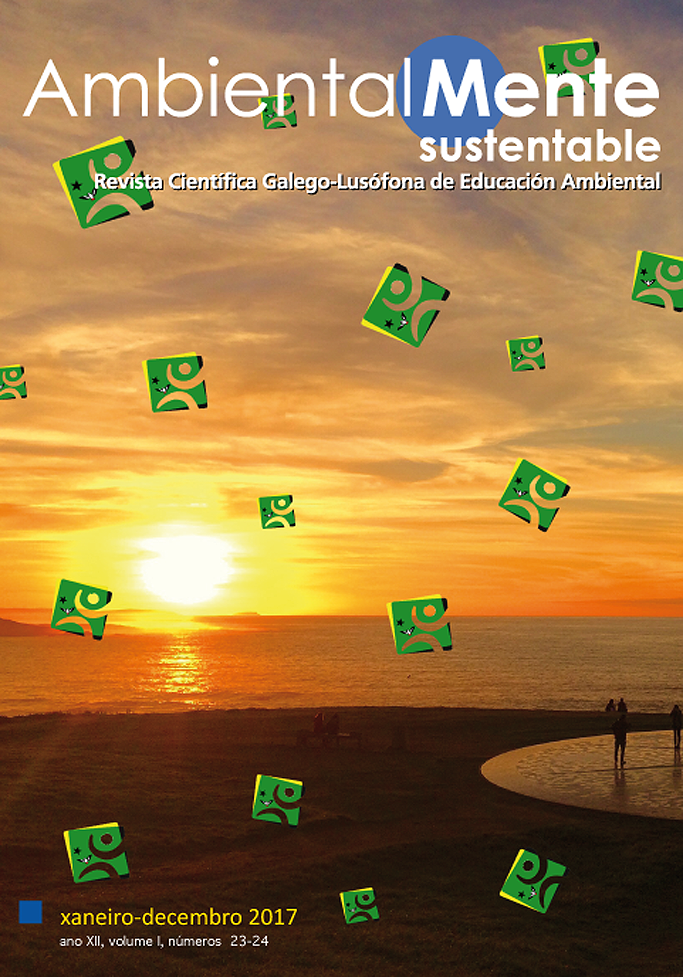Local capacity building and adaptive processes. The place of teachers in the project ClimAdaPT.Local
Main Article Content
Abstract
Assuming the strategic role of municipalities, local communities, and Environmental education in the joint e ort to climate change response, the ClimAdaPT.Local project aimed to launch a set of Municipal Strategies for Adaptation to Climate Change and its integration into municipal planning. The objective was to achieve this goal by developing tools and methodologies, by training local technical sta of 26 municipalities, and by empowering of local actors. This last factor emerged as a sine qua non condition to reach the planned goals and to provide new opportunities for individual and social transformation that can enhance local and global resilience. For this end, within other local actors, teachers of all levels have been mobilised, as well as their formative experience, and their pedagogical capacity to promote individual and collective re ection. This chapter is focused on results of a questionnaire survey, and will draw some conclusions from a comparative analysis that posits the added value of teachers in the community mobilisation process, and confronts their positions, capacities and predispositions with other local actors equally mobilised for adaptation and environment protection.
Keywords:
Downloads
Article Details
References
Anderson, Allison (2012): “Climate Change Education for Mitigation and Adaptation”, em, Journal of Education for Sustainable Development, 6 (2): 191-206.
Campos, Inês, Guerra, João, Ferreira, José, Schmidt, Luísa, Alves, Filipe, Vizinho, André, Penha-Lopes, Gil (2017): “Understanding climate change policy and action in Portuguese municipalities: A survey”, em, Land Use Policy, 62: 68-78.
Caride, José Antonio e Meira, Pablo Angel (2001): Educación ambiental y desarrollo humano. Barcelona: Editorial Ariel.
Garcia, Ernest, Martinez-Iglesias, Mercedes, Kirby, Peadar (Eds.) (2017): Transitioning to a Post-Carbon Society: Degrowth, Austerity and Wellbeing. Londres: Palgrave Macmillan.
Gonçalves, Ana, Guerra, João (2007): Do ensino experimental da ciência à cidadania ambiental: o caso EuroLifeNet. In I Congreso Internacional de Educación Ambiental dos Países Lusófonos e Galicia: Comunicacións. A Coruña: Centro de Extensión Universitaria e Divulgación Ambiental de Galicia.
Gonçalves, Ana, Guerra, João, Schmidt, Luísa (2007): EuroLifeNet: Análise Sociológica dos Impactos nos Valores e nas Atitudes Sociais dos Estudantes sobre a Poluição do Ar. Lisboa: Observa/Instituto de Ciências Sociais da Universidade de Lisboa.
Guerra, João (2009): “Sustentabilidade e participação. O papel dos executivos municipais no envolvimento das populações”, em, Espacio Abierto - Cuaderno Venezolano de Sociología, 18 (4): 605-625.
Guerra, João, Travassos, David (2017): Inquérito aos municípios beneficiários do projeto ClimadaPT.Local – relatório global final. Lisboa, ICS-ULisboa/FCUL.
Jackson, Tim (2009): Prosperity without growth: economics for a finite planet. London, Earthscan.
Pardellas Santiago, Miguel, Meira Cartea, Pablo, Iglesias da Cunha, Lucía (2017). El movimiento de las Comunidades en Transición e la Educación Ambiental. In Arto Blanco, Mónica, Meira Cartea, Pablo (coords.). RESCLIMA: Aproximación ás Claves Sociais e Educativas do Cambio Climático. Ferrol: Aldine Editorial, 47-52.
Plass, Gilbert N. (1956): “The carbon dioxide theory of climatic change”, em, Tellus, 8 (2): 140-154.
Roberts, Simon (2012): “The role of local authorities in galvanizing action to tackle climate change: a practitioner’s perspective”, em, Peters, Michael, Fudge, Shane, Jackson, Tim (orgs.), Low Carbon Communities − Imaginative Approaches to Combating Climate Change Locally. Cheltenham, Edward Elgar: 75-88.
Schmidt, Luísa e Guerra, João (2013): “Do Ambiente ao Desenvolvimento Sustentável – Contextos e Protagonistas da Educação Ambiental em Portugal”, em, Revista Lusófona de Educação, 25: 193-211.
Schmidt, Luísa, Ferrão, João, Guerra, João, Mourato, João, Alves, Adriana, Baixinho, Alexandra, Ferreira, José (2015): “Adaptação às Alterações Climáticas nos municípios: um processo de aprendizagem social”, em, Ferrão, João e Horta, Ana (orgs.). Ambiente, Território e Sociedade – Novas Agendas de Investigação. Lisboa, Imprensa de Ciências Sociais: 125-131.
Schmidt, Luísa, Nave, Joaquim Gil, Guerra, João (2010): Educação Ambiental: Balanço e perspetivas para uma agenda mais sustentável. Lisboa, Imprensa de Ciências Sociais.
Schmidt, Luísa, Nave, Joaquim Gil, O` Riordan, Tim, Guerra, João (2011): “Trends and dilemmas of environmental education in Portugal: retaining an old agenda in the face of new opportunities” em, Journal of Environmental Policy and Planning, 13 (2): 1-19.
Schmidt, Luísa, Delicado, Ana (2014): Alterações Climáticas na Opinião Pública. In Schmidt, Luísa, Delicado, Ana (orgs.). Ambiente, Alterações Climáticas, Alimentação e Energia – A opinião dos portugueses. Lisboa: Imprensa de Ciências Sociais: 113-144.



